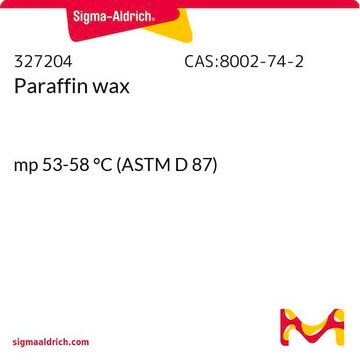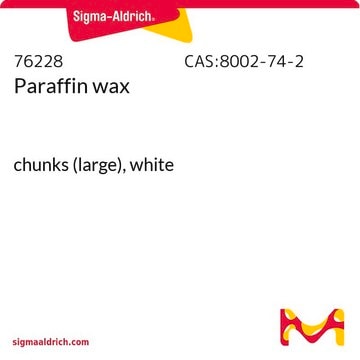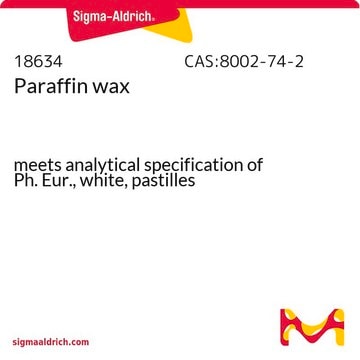Recommended Products
form
pastilles
color
white
mp
43-95 °C
transition temp
solidification point 55-60 °C
InChI key
JWHAUXFOSRPERK-UHFFFAOYSA-N
Looking for similar products? Visit Product Comparison Guide
Storage Class
13 - Non Combustible Solids
wgk_germany
nwg
flash_point_f
602.6 °F - Pensky-Martens closed cup
flash_point_c
317 °C - Pensky-Martens closed cup
ppe
Eyeshields, Gloves, type N95 (US)
Choose from one of the most recent versions:
Already Own This Product?
Find documentation for the products that you have recently purchased in the Document Library.
Customers Also Viewed
Laiguo Chen et al.
Journal of chromatography. A, 1274, 36-43 (2013-01-05)
Accurately quantifying short chain chlorinated paraffins (SCCPs) in soil samples with gas chromatograph coupled with electron capture negative ionization mass spectrometry (GC-ECNI-MS) is difficult because many other polychlorinated pollutants are present in the sample matrices. These pollutants (e.g., polychlorinated biphenyls
Zhi-Yong Zhang et al.
Journal of hazardous materials, 243, 105-111 (2012-10-31)
In this study, nanoscale zero-valent iron (NZVI) particles were synthesized and used for the reductive dehalogenation of short chain chlorinated paraffins (SCCPs) in the laboratory. The results show that the dechlorination rate of chlorinated n-decane (CP(10)) by NZVI increased with
Banu Dilek et al.
Archives of physical medicine and rehabilitation, 94(4), 642-649 (2012-11-29)
To evaluate the efficacy of paraffin bath therapy on pain, function, and muscle strength in patients with hand osteoarthritis. Prospective single-blinded randomized controlled trial. Department of physical medicine and rehabilitation in a university hospital. Patients with bilateral hand osteoarthritis (N=56).
Xue-Tong Wang et al.
Environmental science and pollution research international, 20(7), 4742-4749 (2013-01-08)
Short-chain chlorinated paraffins (SCCPs) are extremely complex technical mixtures of polychlorinated n-alkanes with carbon chain lengths from C10 to C13 and chlorine content between 49 and 70%. SCCPs are under consideration for inclusion in the Stockholm Convention on persistent organic
Lindy Rauscher et al.
Journal of hazardous materials, 241-242, 441-449 (2012-10-24)
Surface waters impacted by urban runoff in metropolitan areas are becoming increasingly contaminated with polycyclic aromatic hydrocarbons (PAHs). Slow-release oxidant candles (paraffin-KMnO(4)) are a relatively new technology being used to treat contaminated groundwater and could potentially be used to treat
Our team of scientists has experience in all areas of research including Life Science, Material Science, Chemical Synthesis, Chromatography, Analytical and many others.
Contact Technical Service










